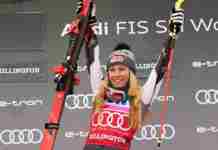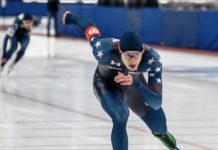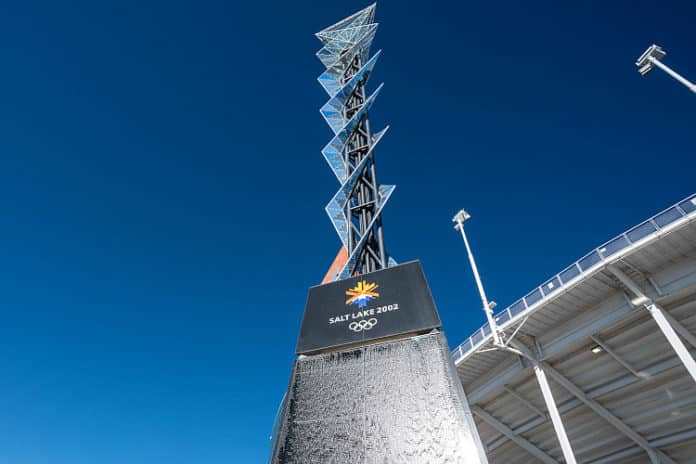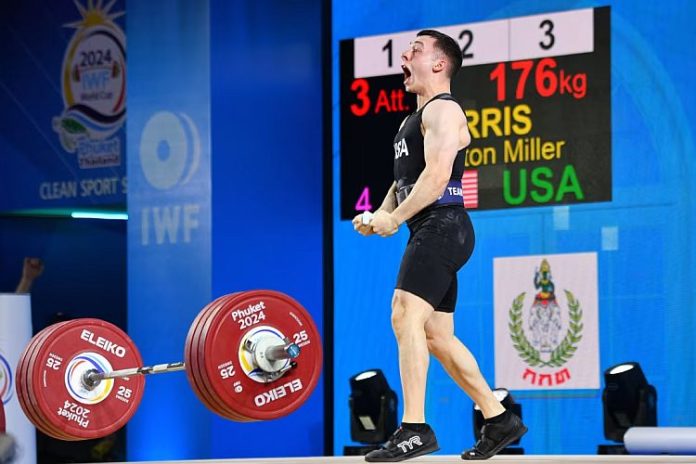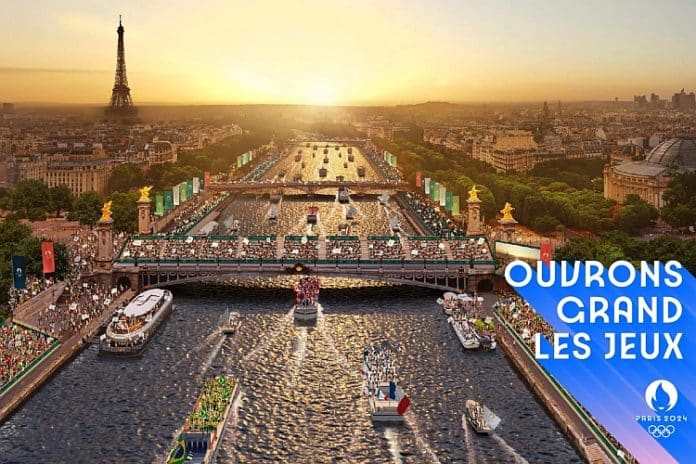★ The Sports Examiner: Chronicling the key competitive, economic and political forces shaping elite sport and the Olympic Movement.★
★ To get The Sports Examiner by e-mail: sign up here! ★
≡ THE 5-RING CIRCUS ≡
1. Salt Lake City: 100% existing venues, 82% same as 2002
2. IOC puts national boxing feds on notice: 2028 decision next year!
3. Future of ANOC World Beach Games decided on 28 April?
4. Worrying has officially started on LA28 transportation
5. WADA reports testing in 2022 up, close to pre-pandemic levels
● With the International Olympic Committee’s Future Host Commission coming next week for a visit, the Salt Lake City-Utah Commission for the Games released its venue assignment proposal for the 2034 Olympic Winter Games. No new venues are planned, with all 11 sites previously used for the 2002 Winter Games; the ceremonies and village will once again be at the University of Utah.
● The IOC posted a statement on the dismissal of the International Boxing Association appeal of its expulsion from the Olympic Movement, and warned national boxing federations that the sport will not be included on the LA28 program if a new international federation – such as the new World Boxing group – is not in place by “early 2025.”
● At the Oceania National Olympic Committees General Assembly last week, the fallout of Indonesia’s cancellation of the ANOC World Beach Games last week was noted, with the Association of National Olympic Committees possibly pursuing a lawsuit to recover losses from the event not being held. The future of the World Beach Games concept may be decided at the next ANOC Executive Committee meeting on 28 April.
● A Los Angeles Times story reported on a worried Los Angeles County Metropolitan Transportation Authority over its responsibilities for public transportation during the 2028 Olympic Games. But Metro Director (and L.A. City Council member) Katy Yaroslavsky said of the Games, “It’s also an excuse to go after federal funding and state dollars in a way we might not otherwise be able to do.”
● The World Anti-Doping Agency released its 2022 testing report, showing total doping tests close to the 2019 pre-pandemic level. However, the number of positive tests was significantly lower than in 2019, a good sign. The most-tested sport and the sport with the most positive tests was Athletics.
● World Championships: Curling (Edin’s Swedes undefeated in men’s Worlds so far) ●
● Panorama: World University Games (North Carolina’s 2029 WUG will be held from 11-22 July) = Russia (World Rowing charging CHF 20-22,000 to evaluate neutrality of six athletes and two staff for qualifying events) = U.S. Olympic & Paralympic Committee (Athletes’ Commission asking for petition signatures for independent status) = Athletics (New York MTA asking N.Y. Road Runners for $750,000 for NYC Marathon crossing the Verrazano-Narrows Bridge) = Football (3: Rubiales arrested and released on Spanish Super Cup inquiry; Morocco to build 115,000-seat stadium for 2030 World Cup; FIFA confirms North Korea forfeit of March World Cup qualifier vs. Japan and adds a fine) = Swimming (Chicago River also being cleaned with open-water event in September) ●
1.
Salt Lake City: 100% existing venues, 82% same as 2002
The Salt Lake City-Utah Committee for the Games announced its venue line-up for its proposed 2034 Olympic Winter Games on Wednesday, with nine of 11 competition sites the same as at the 2002 Winter Games and all 11 sports sites both existing and heavily used in 2002 (* = same venue as in 2002):
● Alpine Skiing: Snowbasin* (in Ogden, Utah)
● Biathlon: Soldier Hollow Nordic Center* (Midway)
● Bobsled and Skeleton: Utah Olympic Park* (Park City)
● Cross Country Skiing: Soldier Hollow Nordic Center* (Midway)
● Curling: Salt Palace Convention Center (Salt Lake City)
● Figure Skating: Delta Center* (Salt Lake City)
● Freestyle Skiing 1: Block 85 (Salt Lake City: Big Air)
● Freestyle Skiing 2: Deer Valley Resort* (Park City)
● Freestyle Skiing 3: Park City Mountain* (Park City)
● Freestyle Skiing 4: Utah Olympic Park (Park City)
● Ice Hockey 1: Maverik Center* (West Valley City)
● Ice Hockey 2: Peaks Ice Arena* (Provo)
● Luge: Utah Olympic Park* (Park City)
● Nordic Combined 1: Soldier Hollow Nordic Center* (Midway)
● Nordic Combined 2: Utah Olympic Park* (Park City)
● Snowboarding 1: Block 85 (Salt Lake City: Big Air)
● Snowboarding 2: Park City Mountain* (Park City)
● Snowboarding 3: Utah Olympic Park (Park City)
● Speed Skating 1: Delta Center* (Salt Lake City: short track)
● Speed Skating 2: Utah Olympic Oval* (Kearns: long track)
The major changes from 2002:
● Alpine Skiing is all at Snowbasin, after being spread between Snowbasin (Downhills and Super-Gs), Deer Valley (Slaloms) and Park City Mountain (Giant Slaloms).
● Curling was at the 2,000-seat Ice Sheet at Ogden in 2002; the sport is being moved to the larger Salt Palace Convention Center – with seating for 6.500 – which will also house the Main Media Center, as it did in 2002.
● Freestyle Skiing included just four events in 2002 – aerials and moguls – all at Deer Valley. For the 2026 Winter Games, Freestyle has 15 events, now distributed among four venues, including Block 85 in downtown Salt Lake City, which served as the Medals Plaza in 2002 (and will again).
● Snowboard, like Freestyle, had only four events in 2002 – halfpipe and parallel giant slalom – taking place at Park City Mountain. For 2026, 11 events are scheduled, assigned to three venues, including Block 85.
The ceremonies are once again proposed for the University of Utah’s 51,444-seat Rice-Eccles Stadium, with the Olympic Village at the University of Utah, both already existing and operating.
Salt Lake City-Utah Committee chief executive Fraser Bullock, who was the Chief Operating Officer of the 2002 Salt Lake Organizing Committee, said in a statement:
“Our venue partners represent a modern, sustainable approach to sport. They have continued contributing to Utah’s sports legacy with ongoing programs and regular updates. And the ability to bring Big Air into downtown Salt Lake City will create great memories for athletes and spectators.”
The Salt Lake all-existing plan is especially remarkable considering the 2002 Games had seven sports and 78 events and the 2026 Milan Cortina Winter Games will have eight sports and 116 events.
And there are possible new venues coming to the Salt Lake City area, having nothing to do with a Winter Games, including talk of a new arena and perhaps a baseball stadium. If built, they could be incorporated later.
The International Olympic Committee’s Future Host Commission will visit Salt Lake City next week, from 10-13 April. As the targeted candidate for 2034, Salt Lake City is expected to be formally selected at the IOC Session in Paris in July.
2.
IOC puts national boxing feds on notice: 2028 decision next year!
The International Olympic Committee was cheered by the decision of the Court of Arbitration for Sport announced Tuesday that dismissed the appeal by the International Boxing Association of its 2023 withdrawal of recognition.
But its statement issued on Wednesday was much stiffer, following up on warning from President Thomas Bach [GER] warning to national boxing federations that they will need to figure out their next move – which does not include the IBA – pretty soon if they want to see boxing on the Los Angeles 2028 program:
“Following the IBA’s suspension and the subsequent withdrawal of its recognition by the IOC, the Tokyo 2020 and Paris 2024 boxing tournaments, including the qualification process, were and are being organised by boxing units set up by the IOC. This has been done to protect the sport of boxing and the athletes. Because of the universality and high social inclusivity of boxing, the IOC wants it to continue to feature on the programme of the Olympic Games.
“Unfortunately, this is far from certain for the Olympic Games LA 2028 because, for governance reasons, the IOC is not in a position to organise another Olympic boxing tournament. To keep boxing on the Olympic programme, the IOC needs a recognised and reliable International Federation as a partner, as with all the other Olympic sports. …
“Every National Boxing Federation and every NOC that wants its boxers to make their Olympic dreams a reality and win medals will now have to take the necessary decisions. The NOCs and National Boxing Federations thus hold the future of Olympic boxing in their own hands, and the required actions cannot be clearer.
“At the moment, boxing is not on the sports programme for the Olympic Games LA28. In order to remedy this, the IOC needs to have a partner International Federation for boxing by early 2025.”
The World Boxing group, formally constituted last November, was set up to provide a new international federation to ensure boxing’s continued inclusion in the Olympic Games. But it has only 27 national federations at present and forecast it would have 50 by the end of this year.
Now, however, the IOC has enormously increased the pressure on most national federations to make a choice between their existing relationship with the IBA and moving to World Boxing … or doing something else.
Not to be lost in the discussion is the real possibility that if boxing is not included for LA28, some national federations could lose their government funding. So the pressure from the IOC’s deadline will come from multiple sides.
¶
The IBA issued its own statement, decrying – as expected – the Court of Arbitration decision and insisting it did nothing to merit expulsion from the Olympic Movement:
“The International Boxing Association (IBA) has disappointingly heard that the Court of Arbitration for Sport (CAS) did not uphold IBA’s appeal against the decision of the IOC Session that withdrew the recognition of the organization.”
The statement lists the changes that the IBA has made – fully sufficient in its view – and concludes:
“The IBA feels that disregarding these and other improvements suggests a biased view. We further understand this noting that CAS is far from independent of the IOC, bringing those doubts based on comments from [IOC President] Thomas Bach on Tuesday [GER]; by virtue, his expectations of what would be happening, were interestingly released ahead of both parties receiving communication directly from CAS. He also announced the IOC’s victory in this dispute prior to the award being issued.
“Driven by personal and purely political reasons, IOC President disrespected the Olympic Charter and discredited himself and the IOC as an organization naming the reason behind IBA’s recognition withdrawal.
“The IBA will refrain from further comments until the CAS award has been thoroughly analyzed by its legal experts which is taking place right now to draw a conclusion whether the organization appeals to the Swiss Federal Tribunal.”
This is a continuation of the IBA’s position over the many months since its suspension by the IOC. While it can appeal the judgement to the Swiss Federal Tribunal, the grounds on which any changes can be made are quite narrow, and unlikely.
¶
World Boxing posted a statement which concluded:
“This is an urgent situation and the clock is ticking. The leaders of boxing’s National Federations now have a critically important decision to make and we urge every one of them that cares about boxers and the future of the sport to apply to join and support World Boxing in its efforts to ensure boxing remains at the heart of the Olympic Movement, before it is too late.”
3.
Future of ANOC World Beach Games decided on 28 April?
Indonesia was set to host the second edition of the ANOC World Beach Games in Bali in August 2023, but the refusal of the Bali governor to allow Israel to compete caused the event to be canceled on 5 July. The organizers cited a refusal of the national government to release funds for the event, but the refusal to allow Israelis to compete – Indonesia is politically strongly pro-Palestinian – was the real reason.
The implosion of the 2023 event left considerable carnage in its wake and the Association of National Olympic Committees (ANOC) has been trying to determine the way forward, if any.
The decision on the future of the event may come this month.
ANOC Secretary General Gunilla Lindberg (SWE) explained the current status at the General Assembly of the Oceania National Olympic Committees last week:
“As you know, we had problems with last year’s ANOC World Beach Games, and the General Assembly in Bali. They cancelled just four weeks before the event, and we have been struggling and they have really done a lot of harm, to our organization, to the NOCs, and, of course, most of all to the athletes that had qualified.
“We are working with them, we are trying to get money out of them and the good thing is that we at least managed to pay all the NOCs back for the travels that concerning the athletes and your trips.
“But, we don’t give up. We had the President of the Indonesian NOC as I said, at the [ANOC Executive Committee] meeting in December [8th]. He promised he would have a solution until the end of December. Now we are in March, and we have to take other actions, and that may be juridical one.
“So, next meeting coming up is in Athens, in April, the day after the handover of the Torch from Greece to Paris, that’s on the 26th of April. At that meeting, we will, of course, have further discussion about the World Beach Games, and also our ANOC strategic plan evaluation and see our program for the coming year.”
Translation: look for a lawsuit against the Indonesian NOC to be filed, a circumstance which will certainly impact any discussions Indonesia wishes to have with the IOC concerning a future Olympic Games in that country.
Lindberg further detailed the next steps in the life or death of the event:
“We will, of course, make an evaluation on if we should continue or not and what our different stakeholders have to say, so we have had [a] meeting with the previous host, the Qatar Olympic Committee, the IFs, the technical working group of NOCs, the Athletes and the Events Commission, and we will make a report until the next meeting.
“I can say so far all the stakeholders have been very positive, especially of course the athletes, and the IFs want to promote their sport, but we also say that we have to make another format, we have to cut the cost and it should not cost the NOCs anything.
“So we’re trying to have that as a special project.”
Lindberg’s presentation on the World Beach Games showed a slide with the meeting on 28 April to include the “ANOC Executive Council decision.”
4.
Worrying has officially started on LA28 transportation
The headline of Wednesday’s Los Angeles Times story read, “As Paris Olympics near, Los Angeles officials worry about preparations for 2028.”
The focus was not on the LA28 organizing committee, but one of the intransigent aspects of Southern California life over the last century: traffic:
“The steep financial cost of the 2028 Olympic Games is starting to come into closer focus in the run-up to the Paris Games, as Los Angeles planners are tabulating the billions of dollars that will be needed to prevent traffic jams and long waits for commuters.”
Los Angeles Mayor Karen Bass is the current Chair of the Los Angeles County Metropolitan Transportation Authority (“Metro”), and told the Metro Board during its meeting last Thursday (28th):
“We took a delegation to Paris to prepare for the 2028 Olympics and to make sure – here we are on the 40th anniversary of the ‘84 Olympics – but to make sure we have the same kind of outcome and legacy in 2028 that we did in 1984, where, to this day, we continue to benefit from those Olympics.
“So I’m glad that Board Directors [Paul] Krekorian, [Katy] Yaroslavsky and CEO Stephanie Wiggins were also on that trip. And I think it was an exciting trip, but I also think it put fire under us to realize that we need to get far more involved in Olympic preparation and all that it might mean, and I look forward to when the Olympics is over in Paris, that the staff – the [Paris] Mayor’s Office – agreed to do a deep-dive debrief with us on lessons learned.
“The Mayor of Paris agreed to that , and I think we will really look forward to that and I am sorry that other mayors couldn’t be along, especially Mayor [James] Butts [of Inglewood], but he was a little busy during that time.
“But while we were in Paris, the L.A. region secured $900 million in funding to strengthen critical infrastructure …Metro will also receive $139 million to reconnect communities … and improve connectivity throughout L.A. County.”
Yaroslavsky, also an L.A. City Council member, was more explicit about the Paris trip and what happens next:
“It was very illuminating. It was a little bit terrifying. I just want to add a little bit. It really highlighted for me the enormity of the opportunity and the workload we have in front of us, to deliver the Games in four short years.
“Heading into the trip I was really eager to explore the housing, transportation and urban tree canopy investments delivered by Mayor [Anne] Hidalgo and other leaders ahead of those Games.
“The transformative nature of the work was palpable, but it also reinforced for me how rapidly we need collaboration at all levels to deliver the Games in a sustainable way. I’m thinking about 2028 as the drop-dead deadline for accelerating all the work we want to do.
“It’s also an excuse to go after federal funding and state dollars in a way we might not otherwise be able to do, and in my mind, a lot of that is going to be around first-mile, last-mile, delivering our priority transit projects, ensuring we’re not using dirty diesel buses for the Olympics, and, most paramount of all, of course, is housing for our unhoused population.” (Emphasis added)
The Board approved a motion to create a “Legislative Advocacy Working Group for the 2028 Games” specifically designed to lobby for federal and state funding.
The Times’ story quoted Metro’s Chief Innovation Officer Seleta Reynolds, from a committee hearing in March:
“We have a huge challenge when it comes to the supplemental bus system.
“There are no discretionary grants that the federal government offers that will cover operations at that scale. There are very, very few sources of money that could cover that kind of cost.”
Metro reportedly estimates the cost of spectator transit for the 2028 Games at $700 million and could rise of $1 billion if buses have to be leased.
So the worry game is now on, but not related to the Games at all, perhaps another Los Angeles Olympic first.
Observed: It’s important to note that Metro’s transit concerns are not related to the athletes, coaches, officials or news media attending the 2028 Games, as their needs are handled by the LA28 organizing committee.
Metro’s role is for public transportation – including Olympic spectators – which it has worked on tirelessly for decades and has thus far been unable to break Southern California’s long love affair with the car.
5.
WADA reports testing in 2022 up, close to pre-pandemic levels
The 320-page 2022 Anti-Doping Testing Figures report released Wednesday shows the anti-doping world nearly getting back to the pre-pandemic levels for testing, but with – happily – a significant drop on positive tests.
The overall picture showed an increase from 2022 over 2021, but still behind 2019:
● 2022: 256,769 samples analyzed
● 2021: 241.340
● 2019: 278,047
● 2022: 218,774 samples analyzed in Olympic sports
● 2021: 207,008
● 2019: 227,032
● 2022: 1,986 total positive tests (0.77%)
● 2021: 1,560 (0.65%)
● 2019: 2,702 (0.97%)
● 2022: 1,222 total positives in Olympic sports (0.56%)
● 2021: 1,013 (0.49%)
● 2019: 1,519 (0.79%)
So, while testing levels are almost back to pre-pandemic levels, the number of positive tests is down significantly, by 297 in Olympic sports, in 2022 vs. 2019.
The type of tests have not changed substantially, but the beginning of dried-blood-spot technology – a very promising development – was started in 2022. Urine samples accounted for 80.3%, blood tests were collected in 7.9% of cases, dried-blood-spot testing was used for 1.0% and Athlete Biological Passport cases comprised 10.8%.
The top Olympic sports in terms of testing:
● 1. 33,960: Athletics ~ 259 positives (0.8%)
● 2. 33,601: Football ~ 92 positives (0.3%)
● 3. 22,551: Cycling ~ 133 positives (0.6%)
● 4. 15,943: Aquatics ~ 65 positives (0.4%)
● 5. 12,897: Weightlifting ~ 153 positives (1.2%)
Sports with 1% or more positive tests included boxing (49: 1.1%), equestrian (13: 1.4%), golf (4: 1.1%), and wrestling (70: 1.0%).
Among the winter sports, skiing (all forms) had the most tests at 8,398, followed by skating (all types) at 4,607 and then ice hockey (3,779).
The most active national anti-doping agencies in terms of collections in 2022:
● 1. China: 19,228
● 2. Germany: 13,653
● 3. Russia: 10,186
● 4. France: 9,775
● 5. Italy: 9,101
The U.S. Anti-Doping Agency ranked seventh at 6,782.
The anti-doping organizations returning the highest positive-test rates were Syria (50.0% across two tests), Philippines (34.6%), Cambodia (33.3%), Angola and Tanzania (16.7%), Myanmar (15.0%), Oman (12.5%), Guatemala (10.8%), Iraq (10.3%), and Grenada (10.0%).
As usual, the busiest labs in the world were at Cologne (GER: 31,118 tests) and Siebersdorf (AUT: 24.571).
Steroids are still the biggest issue in doping. Among the positive tests, the leading categories were anabolic agents (1,124 or 42%), followed by the related groups of diuretics and masking agents (419 or 16%), then Stimulants (412 or 15%), hormone and metabolic modulators (288 or 11%) and cannabinoids (134 or 5%).
≡ WORLD CHAMPIONSHIPS ≡
● Curling ● The World Curling men’s World Championships continue in Schaffhausen (SUI), with round-robin play now two-thirds complete. Sweden’s Niklas Edin, skip of the 2022 Olympic champs and six-time World Champion, leads the standings with his rink at 8-0, followed by Canada’s 2006 Olympic champ Brad Gushue (7-1), followed by Switzerland (Yannick Schwaller: 6-2) and Scotland’s Beijing 2022 Olympic runner-up Bruce Mouat (6-2).
The top six will advance to the playoffs; the U.S. team is skipped by 2018 Olympic champ John Shuster, sitting seventh at 4-4 so far. Round-robin play will finish on Friday and the playoffs will be held on the weekend.
● Ice Hockey ● The U.S. got strong goal tending from Aerin Frankel and Haley Winn scored twice on the way to a 4-0 win over Switzerland in their opening match of the 2024 IIHF Women’s World Championship, being played in Utica, New York.
Winn scored at 5:23 of the second period for a 1-0 lead and Kendall Coyne Schofield made it 2-0 at the 16:00 mark. Veteran star Hilary Knight scored the third goal at 10:47 of the third and Winn got her second at 14:41. The U.S. out-shot the Swiss by 55-11.
Group play continues through the ninth, with the playoffs beginning on the 11th.
≡ PANORAMA ≡
● World University Games ● The North Carolina organizers and the International University Sports Federation (FISU) agreed on the dates for the 2029 World University Games from Wednesday, 11 July through Sunday, 22 July 2029.
Hill Carrow, Board Chair and chief executive for the North Carolina organizers said in a statement:
“These were the dates recommended and requested by our university hosts and other venues involved in our bid as being the best dates for those host institutions and facilities to be able to accommodate the Games. Now that the dates have been set, we can add more specificity to our project timelines as we continue to plan for the big event.”
● Russia ● There is a cost to trying to qualify as a neutral athlete for the Paris Olympic Games, according to Russian Rowing Federation President Sergei Svirin:
“Russian athletes, who last year were tested by World Rowing for compliance with neutral status, would have to go through this again in the Olympic season.
“For studying the data of six athletes and two specialists, we had to pay the international federation from 20 to 22 thousand Swiss francs.” (CHF 1 = $1.11 U.S.)
Remaining qualification options for Russians include the European qualifier from 25-28 April in Hungary and the world qualifier in Lucerne (SUI) from 19-21 May.
● U.S. Olympic & Paralympic Committee ● The Team USA Athletes’ Commission is pushing for Congress to pass legislation which would make the entity “independent,” with its own funding, although where that funding will come from is not stated.
American athletes are being urged to add their name to a letter to sent to Representatives and Senators which notes the recommendation of the Commission on the State of the U.S. Olympics and Paralympics to make the Athletes’ Commission independent:
“One recommendation is to make Team USA AC completely independent of the USOPC. This is a monumental step for all Team USA athletes, and a long-awaited change in the right direction to ensure a truly empowered athletes’ voice within the Movement.”
The letter says this entails “fairly easy amendments to the Ted Stevens Act to … ensure a steady revenue stream for Team USA AC and any method of securing independent funding must guarantee a revenue stream with which an empowered Team USA AC can hire professional staff with a legal duty to act in athletes’ best interests.”
Observed: Nothing dealing with the Congress and money is ever “easy.”
● Athletics ● “New Yorkers love Marathon Sunday, but taxpayers cannot be expected to subsidize a wealthy non-government organization like the New York Road Runners to the tune of $750,000.”
That’s Catherine Sheridan, head of the New York Metropolitan Transportation Authority, in a statement saying the NYRR should pay a crossing fee for its runners to cross the Verrazano-Narrows Bridge from Staten Island to Brooklyn at the start of the annual New York City Marathon.
NYRR spokesperson Crystal Howard told The Associated Press the organization has asked for the mathematics behind the $750,000 claim, noted the race provides significantly increased MTA ridership and:
“The impact of MTA’s request would represent a material change to the cost structure and would require an increase to how much runners pay to run the Marathon, making it less affordable for local runners and those who travel to New York City from around the world – both of whom contribute hundreds of millions of dollars to the City’s and State’s economy.”
● Football ● Luis Rubiales, the former head of the Royal Spanish Football Federation who lost his position after forcibly kissing Spanish midfielder Jenni Hermoso during the victory ceremony following the 2023 FIFA Women’s World Cup, was arrested and later released on Wednesday by Spanish authorities.
Rubiales was detained as part of a continuing investigation into arrangements made by Rubiales and the RFEF to play the Spanish Super Cup in Saudi Arabia. The first Super Cup to be held in Saudi Arabia was in Jeddah was in 2020, and has subsequently been held there in 2022-23-24, all in Riyadh.
The RFEF reportedly agreed in 2019 on a three-year arrangement, receiving €120 million ($130.04 million U.S. today) to play an expanded four-team tournament in the Middle East.
Rubiales was held and released on his return to Madrid from the Dominican Republic; he is being investigated for “illegal commissions” from the Super Cup deal, with prosecutors asking for a 30-month jail term. Rubiales are denied any impropriety.
¶
A long-planned, giant football stadium near Casablanca, Morocco is coming closer to reality, with €456 million (~$494.1 million U.S.) allocated and construction to be completed by 2026.
If built, it is expected to be the largest stadium in the world at 115,000 seats, and a strong candidate for the 2030 World Cup final; the tournament will be held in Spain, Portugal and Morocco.
The “Grand Stade de Casablanca” would actually be built in El Mansouria, a coastal town of about 20,000, with the design by the Populous (U.S.) and Oualalou + Choi (MAR) selected.
¶
The FIFA Disciplinary Committee ruled Wednesday. on the North Korean forfeit of the 26 March 2024 Asian qualifying match (for the 2026 FIFA World Cup) against Japan, slated to be played in Pyongyang. But the Koreans claimed an “infectious disease” in Japan would not allow them to play. Per FIFA:
“After analysing the various factual elements in light of the applicable regulations, the chairman of the FIFA Disciplinary Committee has decided to declare the match lost by forfeit 3-0 by the representative team of DPR Korea. Additionally, the DPR Korea Football Association has been ordered to pay a fine to the amount of CHF 10,000.”
● Swimming ● While Paris has trumpeted the return of swimming to the Seine River – banned since 1923 – for this summer’s Olympic open-water swimming and triathlon events, a similar effort in the U.S. will re-opened the Chicago River to swimming.
The “A Long Swim” organization, which raises funds for ALS research, is putting on the first Chicago River swims in about 100 years on 22 September. Registration continues to 28 April, with one-mile and two-mile swims being offered, subject to proper water quality.
Participation is limited to 500 swimmers, with participants selected by lottery on 6 May. All swimmers must have previously completed a one-mile or two-mile swim, and in addition to a $50-70 participation fee, all swimmers “agree to fundraise a minimum of $1,500 (USD) for 2-mile swimmers or $1,000 (USD) for 1-mile swimmers to support A Long Swim.”
¶
You can receive our exclusive TSX Report by e-mail by clicking here. You can also refer a friend by clicking here, and can donate here to keep this site going.
For our new, 920-event International Sports Calendar for 2024 and beyond, by date and by sport, click here!








